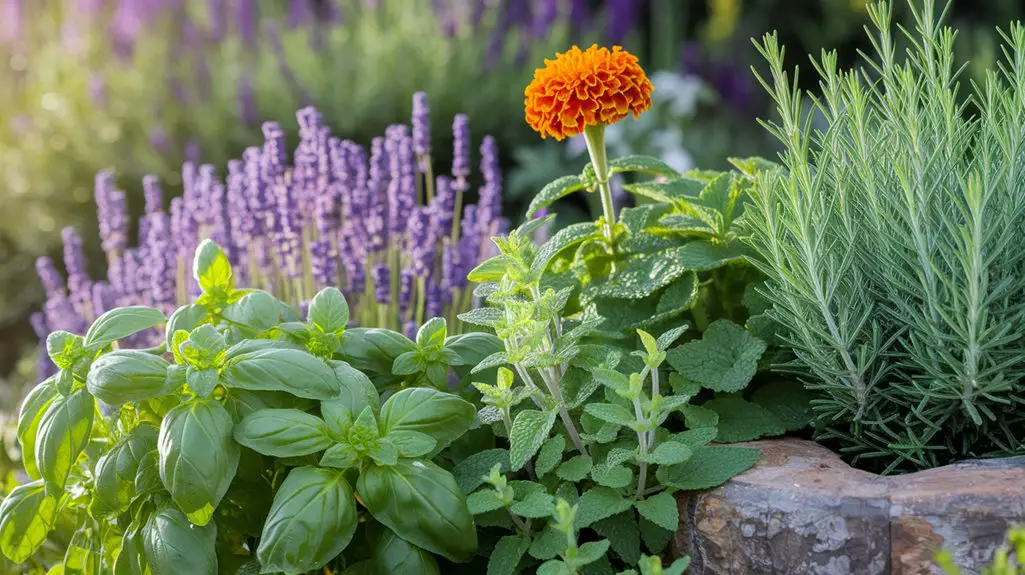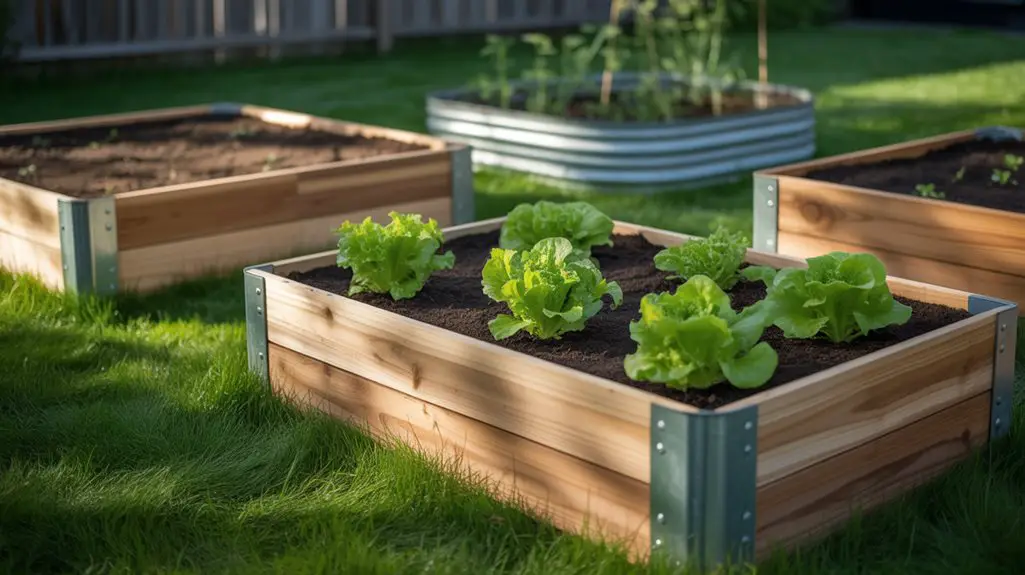Could natural herbs really be your garden’s best line of defense? You’ve likely battled persistent pests that threaten your carefully tended plants, reaching for chemical solutions out of frustration. Yet the answer might already exist within your garden ecosystem. Strategically planting certain aromatic herbs creates a natural barrier that confuses and repels common garden invaders—while simultaneously enhancing your landscape with beauty and fragrance. The following five herbs offer powerful protection without the toxic residue.
Basil: Nature’s Mosquito and Fly Repellent
[Basil stands as a powerhouse in the natural pest control arsenal, offering dual benefits for your garden. This aromatic herb effectively repels mosquitoes, flies, and even thrips through its strong scent compounds, particularly eugenol and citronellol. You’ll find it particularly effective when planted near entryways or outdoor seating areas.
For maximum pest-repelling properties, place basil plants strategically throughout your garden, especially alongside tomatoes and peppers. This companion planting not only deters insects but also enhances neighboring plants’ flavor and growth.
To amplify its repellent effect, brush your hands lightly across the leaves occasionally to release more oils into the air.
Different varieties offer varying levels of effectiveness—Thai basil and lemon basil typically provide stronger pest-deterring properties due to their more potent essential oil concentrations. Additionally, using garlic spray in conjunction with basil can further enhance the natural defense against pests.
Mint: The Powerful Ant and Rodent Deterrent

While basil protects your garden from flying pests, mint offers robust defense against ground-based invaders. The strong aroma of mint’s essential oils overwhelms and confuses ants, mice, and rats, disrupting their scent trails and forcing them to seek shelter elsewhere.
Plant mint strategically around garden perimeters, near entry points to buildings, or alongside vulnerable crops. You’ll find multiple varieties effective, including peppermint, spearmint, and pennyroyal. For targeted protection, create mint-infused sprays by steeping leaves in water overnight. Companion planting with mint can enhance overall pest resistance in your garden.
Be cautious—mint’s aggressive spreading habit demands containment. Plant it in sunken pots or dedicated beds with barriers. This controlled approach lets you harness mint’s pest-repelling benefits without it overwhelming your garden space.
Rosemary: Protection Against Cabbage Moths and Bean Beetles

Renowned for its aromatic profile, rosemary serves as a formidable defender against some of gardening’s most persistent pests—particularly cabbage moths and bean beetles. The herb’s potent oils emit a scent that these destructive insects find overwhelming, making it an excellent protective companion for vulnerable vegetable crops. To maximize rosemary’s pest-repelling benefits:
- Plant rosemary borders around cabbage family crops to create a protective barrier against moth infestations.
- Intersperse rosemary plants between bean rows to disrupt beetle feeding patterns and egg-laying behavior.
- Harvest and crush fresh rosemary sprigs to make a natural spray for targeted application on affected plants.
You’ll find rosemary particularly effective during warm months when pest activity peaks. Additionally, this drought-tolerant herb requires minimal maintenance while providing year-round protection in zones 8 and warmer. Furthermore, rosemary’s strong aroma is known to deter garden pests effectively, making it a valuable addition to any vegetable garden.
Lavender: Keeping Fleas and Moths at Bay
With its delicate purple blooms and distinctive fragrance, lavender stands among the most effective natural pest deterrents for gardens troubled by fleas and moths. The powerful essential oils in lavender’s leaves and flowers emit a scent that these pests find overwhelming, yet humans find pleasant.
Plant lavender near entry points to your home or around your vegetable garden to create a natural barrier. You’ll find it particularly effective at protecting woolens and stored clothing from cloth moths when dried and placed in sachets.
For maximum pest-repelling benefits, position your lavender in full sun and well-drained soil. Prune regularly to encourage bushy growth and stronger oil production. Natural pest deterrents can significantly reduce the need for chemical pesticides in your garden.
French and English varieties offer the strongest pest-deterring properties while simultaneously attracting beneficial pollinators to your garden.
Marigolds: The Companion Plant That Deters Nematodes
Celebrated for their vibrant orange and yellow blooms, marigolds serve as nature’s underground pest management system in your garden.
These hardy annuals release a substance called alpha-terthienyl from their roots that’s toxic to soil-dwelling nematodes, microscopic worms that damage plant roots.
- Plant marigolds as borders around vegetable gardens to create a protective barrier against nematodes, especially around tomatoes, peppers, and potatoes.
- Incorporate them into your crop rotation strategy by growing marigolds for a full season before planting nematode-susceptible crops.
- Choose French marigold varieties (Tagetes patula) for maximum nematode control, as they produce higher concentrations of the pest-deterring compounds.
Additionally, marigolds can attract beneficial insects, which helps to further enhance natural pest control in your garden.
You’ll enjoy both beautiful flowers and healthier plants with this dual-purpose companion plant.
Conclusion
By planting these five powerful herbs, you’ll transform your garden into a fortress against unwanted pests. You won’t need harsh chemicals when nature’s defenders stand guard. Like silent sentinels, basil, mint, rosemary, lavender, and marigolds work tirelessly to protect your precious plants. Incorporate them strategically throughout your garden beds, and you’ll create a harmonious ecosystem that naturally repels invaders while delighting your senses.




